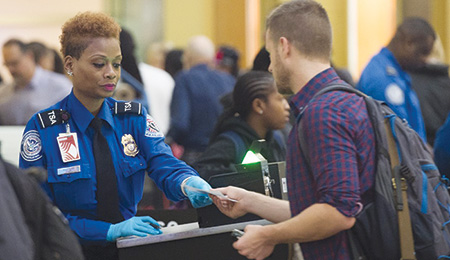 The American Federation of Government Employees (AFGE) is calling on the Transportation Security Administration (TSA) to increase safety protocols after three officers at San Jose International Airport tested positive for the COVID-19, the coronavirus. AFGE says the agency is not doing enough to protect officers and the flying public from infection.
The American Federation of Government Employees (AFGE) is calling on the Transportation Security Administration (TSA) to increase safety protocols after three officers at San Jose International Airport tested positive for the COVID-19, the coronavirus. AFGE says the agency is not doing enough to protect officers and the flying public from infection.
AFGE represents 46,000 TSA officers nationwide. On March 10, the union sent an email to TSA Administrator David Pekoske requesting N95 masks, which are designed to protect wearers from the virus, be provided to the front-line workforce. The agency denied the request.
“Despite our union’s numerous requests for adequate masks and protective equipment, TSA has failed to properly equip our officers with the resources they need to prevent infection,” said AFGE National President Everett Kelley.
TSA has provided optional surgical masks to officers, but according to the U.S. Food and Drug Administration (FDA) surgical masks do not block small particles from coughs and sneezes that spread COVID-19.
Because of their jobs, TSA officers are uniquely susceptible to this outbreak. “Our officers screen more than two million passengers across the country every day,” said AFGE TSA Council President Hydrick Thomas. “We do everything we can to protect passengers, but who is protecting us?”
‘SERIOUS CONCERNS REGARDING HEALTH AND SAFETY’
AFGE detailed workers’ concerns with the government’s response to the coronavirus last week in a statement to the House Oversight and Reform Committee’s hearing on “Coronavirus Preparedness and Response.”

“AFGE has serious concerns regarding the health and safety of the federal workforce and with the administration’s efforts to prevent, detect, and treat the Coronavirus, or COVID-19,” Kelley said.
AFGE represents 700,000 federal and District of Columbia employees in 70 different agencies across the country and around the world, including health care providers and support personnel at the Department of Veterans Affairs (VA), the Department of Defense (DoD) and the Bureau of Prisons (BoP) who are frontline emergency responders including employees at the Federal Emergency Management Agency (FEMA) and employees whose jobs require regular contact with the public, including Transportation Security Officers at TSA and those who work in Social Security Administration (SSA) field offices, and VA Regional Offices.
AFGE’s statement highlighted the following concerns:
- Worker safety: “AFGE is extremely concerned that safety protocols have not been sufficiently communicated to the front-line workforce. Agencies are not communicating with their workforces with enough information or to a degree that will allow them to protect themselves or the public in a timely manner to contain the spread of this virus.”
- Protective equipment: “AFGE finds the recent CDC guidance allowing the use of surgical masks instead of respirators extremely concerning. As we learn more about the ways COVID-19 spreads, the CDC and federal agencies must make certain that all federal employees potentially exposed to the virus have the necessary PPE (personal protective equipment).”
- Telework: “AFGE urges the Committee to insist that all federal government agencies formally give permission to employees who can perform their duties via telework to begin doing so immediately.”
- Compensation: “We are concerned that workers who provide direct patient care and emergency services to individuals who have contracted COVID-19 lack clear, specific guidance and effective preventive equipment and gear to protect themselves from contracting the virus. In cases where workers are exposed to unusual hazards, current law provides for a pay differential, or hazardous duty pay. Because these workers are in immediate danger of exposure, and current protocols have no guarantee of protection, employees required to work and interface with individuals who have been quarantined or diagnosed with COVID-19 should be provided hazardous duty pay.”


